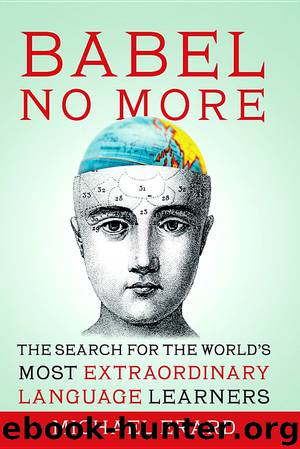Babel No More: The Search for the World's Most Extraordinary Language Learners by Michael Erard

Author:Michael Erard [Erard, Michael]
Language: eng
Format: epub, mobi
Tags: General, History, Science, Language Arts & Disciplines, Linguistics, Life Sciences, World
ISBN: 9781451628265
Publisher: Free Press
Published: 2015-06-19T16:00:00+00:00
Possible explanations for talented language learning fall into two general areas. One view says: What matters is a person’s sense of mission and dedication to language learning. You don’t need to describe high performers as biologically exceptional, because what they do is the product of practice. Anyone can become a foreign-language expert—even an adult. In fact (the story goes), language learners run the gamut, and the successful ones represent the very, very successful end of this spectrum. Their native languages may be as jealous as anyone else’s, but somehow these people aren’t held back from hearing and producing new sounds, words, and grammatical patterns. Believing that language learning isn’t easy and takes work, they commit themselves to using their time efficiently.
The other view says: Something neurological is going on. We may not know exactly what the mechanisms are, but we can’t explain exceptional outcomes fully through training or motivation. C.J. came to play an important role in this view, because Loraine had measured in him the cognitive features that support quick, easy foreign-language learning by adults. Presumably these features are more genetically determined than others; though trainable, they seem to be improvable only within certain margins. In time, C.J. would appear as a case study in other people’s work, including linguist Peter Skehan’s at the Chinese University of Hong Kong. Skehan suggested that what’s so special about C.J. “seems to be the capacity to deal with large quantities of material to be memorized quickly and easily.”
Both Christopher and C.J. have talents that aren’t centrally about language at all, Skehan argued. Rather, they possess cognitive abilities that happen to be very well suited for learning languages. That is, they can recognize patterns and remember learned material. These skills are suited for languages, which are “relatively simple codes which can be learned and operated quickly, and which then can be the basis for the retention of material.” When Skehan wondered “whether there can be an exceptional talent for learning languages, qualitatively different from high [linguistic] aptitude,” his answer was a resolute yes.
Both types of language learners would share a couple of traits. They “would have a high range of lexicalized exemplars, considerable redundancy in their memory systems, and multiple representations of lexical elements. . . . It is assumed that such learners would not value form highly,” he wrote. To translate: they know a lot of words, have many different words for the same meanings, and do not care too much about avoiding errors. People like this have to be biologically different, Skehan suggested. “Exceptionally successful foreign language learners consistently seem to be characterized by the possession of unusual memories, particularly for the retention of verbal material,” he wrote. “Such exceptional learners do not seem to have unusual abilities with respect to input or central processing.” In other words, they learn languages in virtually the same way everyone else does; they just have better memory retention and retrieval.
What does better retention mean? The average person, over a lifetime, will find it easier to learn new facts than to learn new motor or cognitive skills.
Download
Babel No More: The Search for the World's Most Extraordinary Language Learners by Michael Erard.mobi
This site does not store any files on its server. We only index and link to content provided by other sites. Please contact the content providers to delete copyright contents if any and email us, we'll remove relevant links or contents immediately.
Cecilia; Or, Memoirs of an Heiress — Volume 1 by Fanny Burney(32544)
Cecilia; Or, Memoirs of an Heiress — Volume 2 by Fanny Burney(31942)
Cecilia; Or, Memoirs of an Heiress — Volume 3 by Fanny Burney(31928)
The Lost Art of Listening by Michael P. Nichols(7489)
Asking the Right Questions: A Guide to Critical Thinking by M. Neil Browne & Stuart M. Keeley(5757)
We Need to Talk by Celeste Headlee(5608)
On Writing A Memoir of the Craft by Stephen King(4931)
Dialogue by Robert McKee(4386)
Pre-Suasion: A Revolutionary Way to Influence and Persuade by Robert Cialdini(4219)
I Have Something to Say: Mastering the Art of Public Speaking in an Age of Disconnection by John Bowe(3872)
Elements of Style 2017 by Richard De A'Morelli(3339)
The Book of Human Emotions by Tiffany Watt Smith(3300)
Fluent Forever: How to Learn Any Language Fast and Never Forget It by Gabriel Wyner(3077)
Name Book, The: Over 10,000 Names--Their Meanings, Origins, and Spiritual Significance by Astoria Dorothy(2978)
Why I Write by George Orwell(2944)
Good Humor, Bad Taste: A Sociology of the Joke by Kuipers Giselinde(2941)
The Art Of Deception by Kevin Mitnick(2796)
The Grammaring Guide to English Grammar with Exercises by Péter Simon(2737)
Ancient Worlds by Michael Scott(2682)
